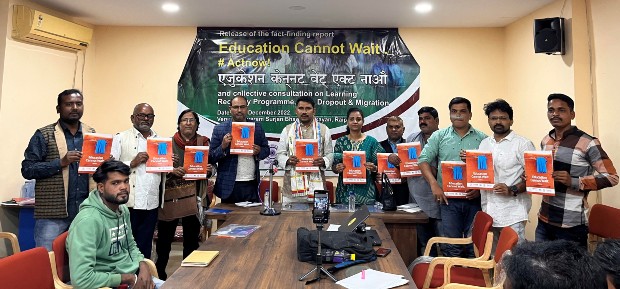Long-term measure needed to bridge learning gap among school children in Chhattisgarh
Raipur: Like other sectors, the COVID-19 pandemic and subsequent lockdown have badly hit the learning ability of schoolchildren in Chhattisgarh and therefore the state government should prioritise its efforts to bridge learning gaps of children in government schools, revealed a recent and joint fact-finding study report release today by non-profit Atmashakti Trust, Dalit Adivasi Manch (DLM), a people’s collective, and Jana Jagaran Samiti an NGO of Chhattisgarh.
The report was launched by the representatives of Chhattisgarh Child Rights Protection Commission and Chairperson of Chhattisgarh Scheduled Caste Commission Mr KP Khande. Among others, member of the State SC commission Mr Sriram Pappu Baghel, Convener of the state RTE Forum Bandopadhyaya, Sudhir Pradhan, Vice President, Teachers’ Federation, Chhatisgarh, representative of the state Backward class, Mr Bibhishan Patra, Secretary, Jan Jagaran Samiti, Mr Devendra Baghel, Dalit Adivasi Manch, Senior Manager of Atmashakti Trust Mr Santosh Kumar, Mr Manoj Samantaray and many other dignitaries attended the release of the report and discussed action strategies to improve learning outcome among children in the state.
The report is based on the online study of 323 villages of Mahasamund, Balodabazar and Janjgir Chapa district of Chhattisgarh, to capture efforts of the state government towards the recovery of learning loss due to school closure during the pandemic and to appraise the state government about the current status of education so that a collaborative efforts can be undertaken to bridge the gap.
The study collected data from 651 respondents on LRP, 367 respondents on RTE norms, 101 respondents on dropouts, and 96 on migration.
Major findings from the study report
● 62.1% of students said that they are facing difficulties in their current curriculum because they aren’t able to link it with their previous year’s curriculum
● The report revealed that Chhattisgarh government has no LRP program in place, which will force children to be at the periphery of education. Therefore, it will be tough for the students to recover from the learning losses during the COVID-19 pandemic.
● The fact-finding Report revealed that 27.52%(101) of schools are short of 1 teacher compared to the number of sanctioned posts in their school. The lack of adequate school teachers enormously affects education in Chhattisgarh. Similarly, 25.88%(95), 19.07%(70), & 7.90%(29) of schools are short of 2,3 and 4 teachers, respectively.
● The fact-finding report disclosed that 14.71%(54) of schools don’t have separate toilets for boys and girls In almost all the offices and institutions, we can find separate toilets for males and females then, why it is not there in schools even after 13 years of the implementation of the RTE, and this is the primary need for the students?
● The fact-finding report also explored the fact that 24. 52%(90) of toilets in schools are lacking water facilities. As per the statement given by parents, there is no use of toilets without proper water facilities.
● The fact-finding report discovers that 12.26%(45) of schools don’t have playgrounds. Playground serves a vital role in the physical and mental health of students. SMC members and parents are seriously concerned about the lack of playgrounds.
● The fact-finding report revealed that out of the 101 dropout cases, 32.67% belong to ST, whereas 26.73%, 38.61% & 1.98% are from SC, OBC, and General categories, respectively. The significant reasons for dropout found from the fact-finding are 32.67% said because they are engaged in household work. 7.92%, 14.85%, 7.92%, & 36.63% have told their dropout reasons as because of difficulties in the curriculum, other logic, parents aren’t interested, engaged in labor work, & either parent has migrated or not interested respectively.
● The fact-finding revealed that 77.22% of students had no opportunity to read, nor was there any scope for them to engage in reading activities because of different issues during the COVID-19 pandemic.
● Current engagement of the migrant students-57.29% have said they are helping their parents in the household work.

